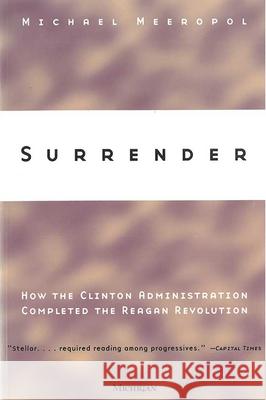Surrender: How the Clinton Administration Completed the Reagan Revolution » książka
Surrender: How the Clinton Administration Completed the Reagan Revolution
ISBN-13: 9780472086764 / Angielski / Miękka / 2000 / 400 str.
Michael Meeropol argues that the ballooning of the federal budget deficit was not a serious problem in the 1980s, nor were the successful recent efforts to get it under control the basis for the prosperous economy of the mid-1990s. In this controversial book, the author provides a close look at what actually happened to the American economy during the years of the "Reagan Revolution" and reveals that the huge deficits had no negative effect on the economy. It was the other policies of the Reagan years--high interest rates to fight inflation, supply-side tax cuts, reductions in regulation, increased advantages for investors and the wealthy, the unraveling of the safety net for the poor--that were unsuccessful in generating more rapid growth and other economic improvements.
Meeropol provides compelling evidence of the failure of the U.S. economy between 1990 and 1994 to generate rising incomes for most of the population or improvements in productivity. This caused, first, the electoral repudiation of President Bush in 1992, followed by a repudiation of President Clinton in the 1994 Congressional elections. The Clinton administration made a half-hearted attempt to reverse the Reagan Revolution in economic policy, but ultimately surrendered to the Republican Congressional majority in 1996 when Clinton promised to balance the budget by 2000 and signed the welfare reform bill. The rapid growth of the economy in 1997 caused surprisingly high government revenues, a dramatic fall in the federal budget deficit, and a brief euphoria evident in an almost uncontrollable stock market boom. Finally, Meeropol argues powerfully that the next recession, certain to come before the end of 1999, will turn the predicted path to budget balance and millennial prosperity into a painful joke on the hubris of public policymakers.
Accessibly written as a work of recent history and public policy as much as economics, this book is intended for all Americans interested in issues of economic policy, especially the budget deficit and the Clinton versus Congress debates. No specialized training in economics is needed.
"A wonderfully accessible discussion of contemporary American economic policy. Meeropol demonstrates that the Reagan-era policies of tax cuts and shredded safety nets, coupled with strident talk of balanced budgets, have been continued and even brought to fruition by the neo-liberal Clinton regime." --Frances Fox Piven, Graduate School, City University of New York
Michael Meeropol is Chair and Professor of Economics, Western New England College.











